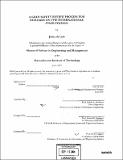A lean safety review process for payloads on the International Space Station
Author(s)
Luis, Javier de
DownloadFull printable version (15.61Mb)
Other Contributors
System Design and Management Program.
Advisor
Jeffrey A. Hoffman.
Terms of use
Metadata
Show full item recordAbstract
The International Space Station has the potential to serve as a unique test platform to enable technologies for a wide array of manned and unmanned NASA missions. In order to live up to its promise, the resources required to develop and fly an experiment on the Station must be commensurate with the scientific return that will be obtained. This thesis applies the set of tools and principles known collectively as Lean Engineering to the Payload Safety Review process, one of the activities that must be satisfied by payloads prior to flying. The goal of this study is to attempt to reduce the required resources needed to fly a payload on the Station. Using the MIT Lean Aerospace Initiative Transformation to Lean roadmap, three separate payload examples of increasing degree of complexity are analyzed. Value streams are derived, and estimates for duration and labor requirements are presented based on past experience and data obtained from various stakeholders. Opportunities for waste (muda) reduction are identified. In addition, a comparative analysis is presented where the Safety Review Process is contrasted to similar issues faced by industry over the last several decades as manufacturing processes were transformed in order to increase quality while simultaneously reducing cost. Insights from these analyses, supported by stakeholder data from payload developers and the NASA Payload Safety Review Panel, are used to suggest a redesign to improve the Safety Review process. Three specific recommendations are proposed: 1) Establishment of a group outside NASA that can provide experienced, design assistance to payload developers as an integral part of their design teams; 2) Empowerment of these integrated teams through elimination of the (cont.) monuments created by intermediary safety reviews conducted by organizations outside the control of the Payload Safety Review Panel; and 3) Preparation of a Safety Verification and Review Plan at the start of each development effort which would contain the schedule and content for all safety-related review activities and data submittals, and would pull these activities throughout the process only when necessary. The revised process reduces the number of discrete steps from a maximum of 27 to 10. Duration of the process and the amount of labor required to complete it are reduced by up to 60% and 20%, respectively. Cost savings on the order of $10 million/year, depending on the number and complexity of the payloads, are obtained.
Description
Thesis (S.M.)--Massachusetts Institute of Technology, System Design & Management Program, 2003. Includes bibliographical references (leaves 131-132).
Date issued
2003Department
System Design and Management Program.Publisher
Massachusetts Institute of Technology
Keywords
System Design and Management Program.